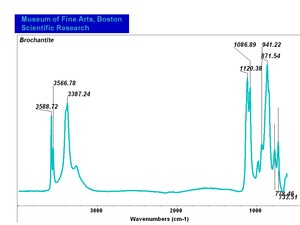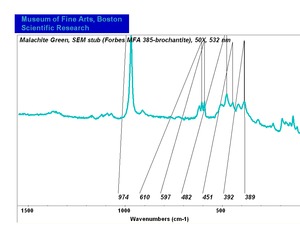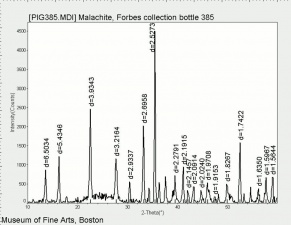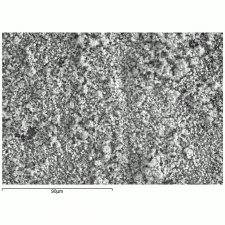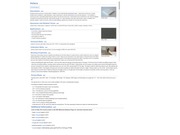Difference between revisions of "Updating CAMEO"
| Line 4: | Line 4: | ||
== UPDATED SPECTRA == | == UPDATED SPECTRA == | ||
| − | [[[SliderGallery rightalign|Brochantite.TIF~FTIR (MFA)|Brochantite Raman MFA 385.TIF~Raman (MFA)|PIG385.jpg~XRD|f385sem.jpg~SEM|f385edsbw.jpg~EDS]]] | + | [[[SliderGallery rightalign|thumb|Brochantite.TIF~FTIR (MFA)|Brochantite Raman MFA 385.TIF~Raman (MFA)|PIG385.jpg~XRD|f385sem.jpg~SEM|f385edsbw.jpg~EDS]]] |
A concerted effort is currently underway to evaluate and upgrade the analytical spectra that are presented in CAMEO. This primarily includes examining current Infrared and Raman spectra to ensure their accuracy as well as to provide images with wavelength markers for the major peaks. See for example the Brochantite slider gallery shown on this page. For this particular sample, the Forbes pigment jar was labeled ‘Malachite Green’, but all analysis techniques confirmed its identity to be brochantite. One of our efforts has been directed toward correctly identifying the pigments in the Forbes reference set. The major work on MFA contributions is being done by Dr. Erin Mysak with support from Sotheby’s Scientific Research Department. Concurrently, Dr. Abed Haddad, the David Booth Fellow in Conservation Science from the Museum of Modern Art in New York City is examining and contributing to the Raman reference set. | A concerted effort is currently underway to evaluate and upgrade the analytical spectra that are presented in CAMEO. This primarily includes examining current Infrared and Raman spectra to ensure their accuracy as well as to provide images with wavelength markers for the major peaks. See for example the Brochantite slider gallery shown on this page. For this particular sample, the Forbes pigment jar was labeled ‘Malachite Green’, but all analysis techniques confirmed its identity to be brochantite. One of our efforts has been directed toward correctly identifying the pigments in the Forbes reference set. The major work on MFA contributions is being done by Dr. Erin Mysak with support from Sotheby’s Scientific Research Department. Concurrently, Dr. Abed Haddad, the David Booth Fellow in Conservation Science from the Museum of Modern Art in New York City is examining and contributing to the Raman reference set. | ||
Revision as of 09:40, 28 January 2020
CAMEO: Conservation & Art Materials Encyclopedia Online
CAMEO is a searchable information resource developed by the Museum of Fine Arts, Boston. The MATERIALS database contains chemical, physical, visual, and analytical information on historic and contemporary materials used in the production and conservation of artistic, architectural, archaeological, and anthropological materials.
UPDATED SPECTRA
A concerted effort is currently underway to evaluate and upgrade the analytical spectra that are presented in CAMEO. This primarily includes examining current Infrared and Raman spectra to ensure their accuracy as well as to provide images with wavelength markers for the major peaks. See for example the Brochantite slider gallery shown on this page. For this particular sample, the Forbes pigment jar was labeled ‘Malachite Green’, but all analysis techniques confirmed its identity to be brochantite. One of our efforts has been directed toward correctly identifying the pigments in the Forbes reference set. The major work on MFA contributions is being done by Dr. Erin Mysak with support from Sotheby’s Scientific Research Department. Concurrently, Dr. Abed Haddad, the David Booth Fellow in Conservation Science from the Museum of Modern Art in New York City is examining and contributing to the Raman reference set.
AIC MATERIALS WORKING GROUP
The Materials Selection and Specification Working Group (MWG) at the American Institute for Conservation (AIC) is leading an effort to provide a resource bank of information that will help develop best practices in selection of materials used in the preservation, transport, and display of cultural heritage. CAMEO has been designated as the platform for the consolidated information on materials with new sets of information added under the headers: Applications, Personal Risks, Collection Risks, Environmental Risks, Working Properties, and Forms/Sizes. The ‘Additional Information’ field will contain links to the Oddy Test results residing in the AIC Wiki (see http://www.conservation-wiki.com/wiki/Materials_Testing). The ‘Environmental Risks’ section will be populated with information developed as part of the recently funded NEH grant for Life Cycle Assessment of materials and treatments used in cultural conservation. CAMEO will also provide links to the Life Cycle Assessment tool that will enable the comparison of carbon footprints for over 3000 materials.
FUTURE DEVELOPMENTS
Stayed tuned to this page for databases that are now in progress for Asian Textiles and Japanese woodblock prints.
USING CAMEO
Please enter your search term in the box on the upper right. Press the Go button for an exact match to an English material name. Press the Search button for a full text search of the records including all non-English (French, Spanish, Italian, Portuguese, German, Dutch, Greek, Polish, Hungarian, etc.) synonyms in the MATERIALS database. CAMEO has recently undergone a major transformation to a wiki based platform. As is inherent in wikis, some databases and pages contained within CAMEO are 'works in progress'. Pages, data, and information will be added and updated on a continuing basis. By using this encyclopedia, you are agreeing to the terms stated in the User agreement.
Click here to view CAMEO’s credits.
